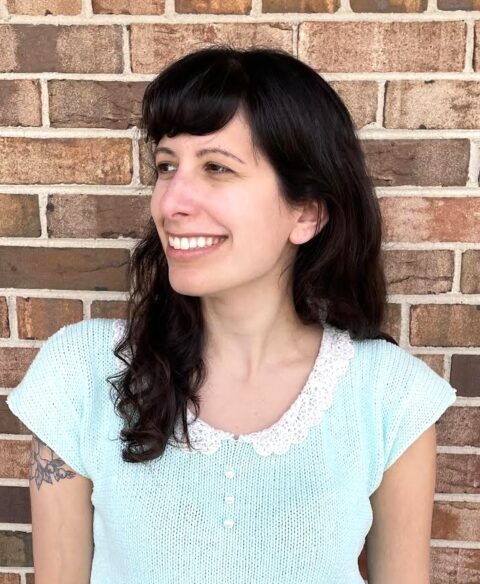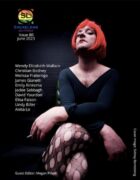There’s something reminiscent of Kincaid in your family- and woman-oriented storytelling. It’s also a tone that feels almost like a lullaby—rhythmic with repetitive tones within the prose: swoop, scoop, writhing, rooting, her voice like dry grass, the mother bird singing and fussing. Did you purposefully include the poetry and musicality in your prose?
I love the idea of rhythm and repetition in this piece feeling like a lullaby. I don’t think I consciously considered that while writing, but it absolutely turned out this way because of the situation the mother has been forced into, and the impossible decision she has to make. She’s trying to comfort herself and her children when there’s no comfort to be had.
Also, I think this story needed rhythmic, poetic language, because I knew I wanted a symbolic, surreal ending. Hopefully, the language in this piece will lull the reader into a mythical, poetic space, so that the ending feels natural and not too unexpected or jarring.
Even after blurbing your collection, I’m still blown away with your descriptive powers, especially in such a small space with evocative phrases like: sun-blistered skin, cured lamb, sandpaper tongue, smooth blue egg with wheat-colored speckles, unhatched jewel, sun a ripe persimmon, and the flow of death a river below us. You do such a lovely job of world-building without sacrificing character details. Speak a little to the cultural backdrop. How did you choose these specific details? What special resonance or meaning do they hold for you?
Most of the cultural backdrop of this piece comes from family stories about Armenia. I’ve never been there, but I know that my ancestors had orchards near their home and lived in this beautiful, lush region. I’ve also heard and read about the harsh details of the genocide in 1915. I wanted to explore the sharp contrast between the “before” world for these characters—their home, the beauty of daily life—and then the parched desert, the fruit spoiling, going bad, everything dry and inhospitable. The metaphor of birds and eggs and nests also felt fitting for this piece, in the way that it captures fragility, but also the potential for hope and new life.
There’s a colloquial familiarity here but also a woman narrator who tells her story in beautiful prose, speaking eloquently of grief and motherhood and emptiness, an in-between space where even already-mothers may feel lost but also show strength. The narrator’s other daughters are present and involved, acting as a comfort to their mother. It’s clear you’ve carefully chosen your words. How did you choose these themes? What is the importance of strong women/mothers/daughters to you? Generational? Cultural?
Oh, I love this observation! I’m so fascinated by the complexity of how parents and children—and in this case, mothers and daughters—care for each other, what they give to each other, what they sacrifice. When I started writing this story, I knew I wanted to give the characters some form of escape or release that was impossible in real life. But it surprised me when I realized it wouldn’t be the mother who rescued them–that it would be the two daughters who became wings. The ending is very open to interpretation, but for me, it captures some of what is hard to put into words about intergenerational trauma. As parents, we pass things down to our children, both good and bad. We try to keep them safe, but it’s not always in our control. And as children, we carry our family forward to places they couldn’t have gone alone. But also, it’s not overly simplistic—we can’t be held responsible for “saving” our parents, and we are still deeply linked to what came before, even as we move forward. The lines are blurred.
I looked up the meaning of the Aghavni—Armenian for “dove,” which plays into the hope in the title but also continues the bird motif. A “first draft” means there are future drafts, and maybe final projects/babies that do reach completion. Was any of this from personal or family experience?
This piece does come from my family’s experience—a wistful, mythical ending to a story that was passed down to me. In real life, my great grandma was one of the sisters in the desert with her mother and siblings. Their mother really did try to leave the baby behind, but in the end, she couldn’t do it and went running back. When my great aunt told me this story, she concluded with, “Of course, the baby died.”
That sentence stuck in my head. In real life, the baby died. The mother died. Some of the children survived. When I was little, I identified with the children, but now, as a mother, I find myself identifying with my great-great grandmother. It forces me to feel the heartbreak of it, the helplessness. There’s this illusion that if we love enough or are resilient enough, we’ll be able to magically keep our children safe. But the truth is, many parents are having their power to protect their children stolen from them.
I wanted to rewrite the ending of this story to explore what could’ve happened if it was a myth—if there was a way to just soar away from violence and death. But at the same time, I wanted the title to invoke what really happened and maintain the contrast between the two. I hope the ending captures some of the grief and yearning of trauma, while also allowing the characters to reclaim their power and agency—if only in fiction.
What are you working on next, recent publications you’re proud of, and where can we find you?
My fiction chapbook, Love at the End of the World, was recently published with The Masters Review. It looks so beautiful, and I’ve been so thrilled to be able to share it with readers! I’ll be doing a Q and A about the book with the Shorter Is Better Book Club in July. I’m on Twitter and Instagram at @lindymbiller.


